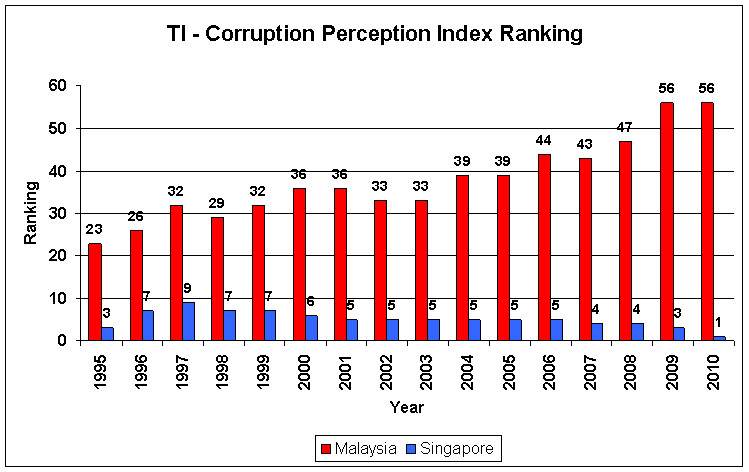Source: Transparency International [Note: 1 = least corrupt]
Can and should Malaysia learn from Singapore on how to reduce corruption?
Singapore (together with Denmark and New Zealand) , in 2010, was ranked least corrupt nation in Transparency International’s Corruption Perception Index.
There are many reasons why the Barisan Nasional (BN) government should seek Singapore’s assistance:
- Both are classified as semi-democracies;
- Both have had a single party or coalition leading it since independence;
- Both have had long serving leaders who are often described as authoritarian;
- Both have a shared history, shared border, shared cultural and social ties;
- There are many Malaysians in Singapore. Approximately 10% of Singapore’s labour force are from Malaysia. This does not include Malaysians who have become citizens of Singapore;
- Both have significant government intervention in the economy through the Government Linked Corporations (GLCs).
More importantly, Malaysia’s efforts have obviously failed despite Malaysia having all the necessary laws and enforcement agencies to prevent corruption.
Furthermore, stamping out corruption has been an important feature of the pious BN government. Mr. Mahathir Mohamed introduced Bersih, Cekap, Amanah (Clean, Efficient, Trustworthy) as his administration’s motto. Morality and ethics also featured prominently in Mahathir’s Vision 2020 , Malaysia’s long term objective, with one of the nine challenges dedicated to achieving this.
“The fourth is the challenge of establishing a fully moral and ethical society, whose citizens are strong in religious and spiritual values and imbued with the highest of ethical standards.”
Mr. Abdullah Ahmad Badawi launched the National Intgrity Plan and the National Integrity institute among many policies to reduce corruption.
Mr. Najib Razak has followed suit. To his credit, Mr. Najib has formally recognised the scourge of rent seeking culture, institutional leakages and institutional degradation. He has ambitiously stated in his New Economic Model and his Government Transformation Plan that there will be zero tolerance for corruption, in his administration.
The results to date however does not augur well for Mr. Najib. The perception created thus far is that corruption under the Najib administration is at its peak in Malaysia. The continued abuse of government procurement, the scandal plagued Mass Rapid Transit (MRT) Project, the 1Malaysia e-mail and Mr. Najib’s use of tax payer’s money for his personal agenda are just some of the more high profile examples. And we have yet to even discuss Malaysia’s First Lady’s (no, not the Queen) penchant for fame and all things expensive.
Mr. Najib Razak would be wise to consult Mr. Lee Hsien Loong on how the People’s Action Party manages to reduce corruption while staying in power for so long.
[Note: The methodology to calculate the TI – CPI is available here. In summary the CPI is calculated based on 13 major surveys. ] Facebook
Facebook  Twitter
Twitter  Soundcloud
Soundcloud  Youtube
Youtube  Rss
Rss 